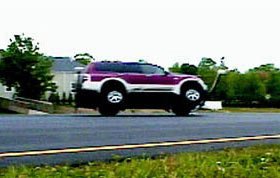The problem was first found during short-course avoidance-maneuver testing of the Montero Limited and six other mid-sized SUVs at Consumer Reports' Auto Test Facility in East Haddam, CT on May 16. None of the other six vehicles tipped up during the tests. The short-course avoidance maneuver is one of CU's standard tests for SUVs. "On that same day, on the same course and with the same drivers, we tested six other similarly-sized SUVs and none of them exhibited any problems with tip-ups. We believe that a vehicle that tips up severely in our tests is exhibiting dangerous behavior," said Dr. R. David Pittle, Senior Vice President and Technical Director of Consumers Union (CU), the publisher of Consumer Reports. The 2001 Montero Limited that Consumer Reports tested on May 16 was a red vehicle manufactured in May 2000. Of 21 completed runs made in Consumer Reports' short-course avoidance-maneuver test on that date by its three test engineers, the red Montero tipped up on two wheels in 8 out of 9 runs at 36.7 mph or faster. In one run at 37.7 mph, it tipped up so far that the safety outriggers contacted the ground. Because of this behavior, CU's Auto Test Center purchased a second sample, a silver Montero Limited, manufactured in March 2001. Along with some other vehicles in this test group, both Monteros were tested on the same short course by vehicle-dynamics consultant R. Wade Allen, who also assessed the previous avoidance-maneuver test results. Both Monteros tipped up severely, and both, CU believes, would likely have rolled over if not for the safety outriggers. It is uncommon for a vehicle to be rated "Not Acceptable" by Consumer Reports. Of the 118 vehicles Consumer Reports has tested in its short-course emergency avoidance maneuver during the past 13 years, only the Suzuki Samurai in 1988; the Isuzu Trooper and its twin, the Acura SLX in 1996, and now the Mitsubishi Montero Limited have tipped up so severely as to be judged "Not Acceptable." Based on the emergency-handling test results, the article about the Montero advises, "If you're shopping for an SUV, we advise you not to buy the 2001 Montero Limited until this safety problem has been corrected. In our opinion, there are safer choices." Mitsubishi Motor Sales of America was advised of Consumer Reports' findings and invited to visit its track via a letter faxed and received on May 31. Representatives of the automaker visited CU's Auto Test Facility in Connecticut on June 5 to view videotape of the 2001 Montero Limited testing and inspect the tested vehicles and test course. In response, Mitsubishi said that the Montero Limited has undergone a full range of tests validating the company's confidence in the vehicle, and that the company had received no customer complaints about its stability. Mitsubishi also disputed CU's findings and methodology. (See "Mitsubishi's Response" on p. 25 of the article.) The seven mid-sized SUVs were being tested in preparation for reviews in the September issue of Consumer Reports. The other vehicles tested were the: 2001 Dodge Durango, 2002 Ford Explorer, 2002 GMC Envoy, 2001 Jeep Grand Cherokee, 2001 Nissan Pathfinder, and 2001 Toyota 4Runner. Consumer Reports' "Not Acceptable" evaluation applies only to the 2001 Mitsubishi Montero Limited, and not to previous Montero models or to the Montero Sport, which are different vehicles. CU did not test the XLS, another trim line of the 2001 Montero. Consumer Reports' avoidance maneuvers are designed to simulate real-world situations in which a driver needs to suddenly steer around an obstacle in the road. CU auto-test engineers run two types of avoidance maneuvers: "long" and "short" course tests. In both, a vehicle is driven at progressively faster speeds so that test engineers can assess its handling characteristics under emergency-avoidance conditions. The tests are not designed to elicit a rollover, but CU considers vehicles that tip up severely in its tests to be exhibiting dangerous behavior. Only the Montero Limited tipped up in this group of seven SUVs. Since CU believes that the severe tip-ups in its tests demonstrate unsafe performance, it considers the vehicle "Not Acceptable." Consumer Reports urges owners of 2001 Montero Limiteds to always wear a seatbelt, drive with caution, and not carry cargo on top of the vehicle. Carrying cargo, and even carrying passengers, raises a vehicle's center of gravity, which can increase the risk of rollover. Consumer Reports believes that Mitsubishi should issue a recall and improve the vehicle's stability. This would follow the example set in 1997 by Daimler-Benz (now DaimlerChrysler, which owns a 37.3 percent stake of Mitsubishi Motors Corporation), when that company recalled and corrected the Mercedes-Benz A-Class after it rolled over in similar tests conducted by a Swedish automotive magazine. Consumer Reports has found no reports of rollover crashes involving the 2001 Montero, but believes that its test results point to an unnecessary risk. Taller vehicles such as SUVs have a higher center of gravity, which makes them more top-heavy and more susceptible to rolling over than lower vehicles such as sedans. This is why the government requires all SUVs with a wheelbase of 110 inches or less-including the 2001 Montero-to display rollover risk warning labels. Last January, the National Highway Traffic Safety Administration (NHTSA) implemented its Rollover Resistance Rating, a five-star system based on static measurements of a vehicle's dimensions. It is intended to provide an estimate of rollover risk in a single-vehicle accident. Consumers Union, which has twice petitioned NHTSA to develop a dynamic rollover test since 1988, believes the agency's rating system is inadequate because it isn't based on tests of a moving vehicle and can't account for what could be critical differences in emergency handling caused by suspension design, tires, steering response, or the presence of a stability-control system. In October 2000, Congress directed NHTSA to develop and implement a dynamic rollover test by November 2002. Currently in the planning stages, this would be based on actual on-road handling tests. Consumers Union supports this approach. |
|||

 YONKERS,
NY - Consumer
Reports® has rated the 2001 Mitsubishi Montero Limited "Not
Acceptable" after it tipped up severely on two wheels during
CU's emergency avoidance-maneuver tests.
YONKERS,
NY - Consumer
Reports® has rated the 2001 Mitsubishi Montero Limited "Not
Acceptable" after it tipped up severely on two wheels during
CU's emergency avoidance-maneuver tests.